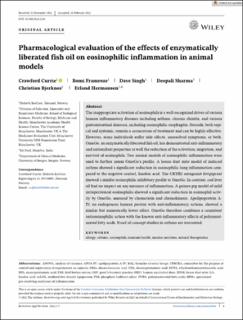| dc.description.abstract | The inappropriate activation of eosinophils is a well-recognized driver of various human inflammatory diseases including asthma, chronic rhinitis, and various gastrointestinal diseases, including eosinophilic esophagitis. Steroids, both topical and systemic, remain a cornerstone of treatment and can be highly effective. However, some individuals suffer side effects, unresolved symptoms, or both. OmeGo, an enzymatically liberated fish oil, has demonstrated anti-inflammatory and antioxidant properties as well the reduction of the activation, migration, and survival of eosinophils. Two animal models of eosinophilic inflammation were used to further assess OmeGo's profile. A house dust mite model of induced asthma showed a significant reduction in eosinophilic lung inflammation compared to the negative control, linoleic acid. The CRTH2 antagonist fevipiprant showed a similar eosinophilic inhibitory profile to OmeGo. In contrast, cod liver oil had no impact on any measure of inflammation. A guinea pig model of mild intraperitoneal eosinophilia showed a significant reduction in eosinophil activity by OmeGo, assessed by chemotaxis and chemokinesis. Apolipoprotein A-IV, an endogenous human protein with anti-inflammatory actions, showed a similar but numerically lower effect. OmeGo therefore combines a consistent antieosinophilic action with the known anti-inflammatory effects of polyunsaturated fatty acids. Proof-of-concept studies in asthma are warranted. | en_US |

